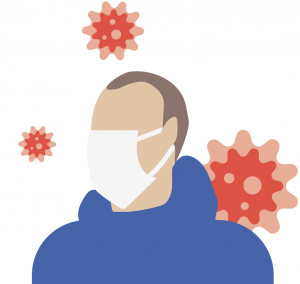Even just an individual scan is difficult to perform. Are our relationships closer, having shared a threat to life, or more distant now? Have we discovered new truths about ourselves? Can we carry any positives into the future? Or will we be left with a sad and painful imprint?
In the SCI community, a handful of COVID outcomes are readily evident. Some barriers have grown larger. Some elements of personal and health care have become more difficult. Some essential supplies have been harder and more expensive to acquire. And many have felt the impact of increased isolation.
Community magazine spoke to four SCIO staff members to gather their insights and input on the impact of COVID on the community. They share the challenges and benefits of this unprecedented time.
Accessibility & Universal Design
It’s a better world when every environment, product and service is designed so it can be fully accessed and used by all people, regardless of age, size or ability. A fundamental element of good design is that it benefits all.
Overall, this pandemic has seen stronger efforts by government, businesses and services to increase access to what they offer. There is greater variety in what can be purchased and delivered and some costs have dropped as demand has risen. In addition, virtual health care has expanded, providing more online channels for care than in the past.
“Widespread change happens when there is economic pressure or political will,” says Peter Athanasopoulos, Director of Public Policy at SCIO. “Mass numbers of people demanding quality goods and services online creates pressure. And government money becomes available for developing new or better policies when pressure reaches critical mass. A pandemic like this can make shifts in a positive direction for the disability community because of the sheer number of people impacted. To sustain a positive direction for people with disabilities from the learnings of the pandemic, we must ensure our community stays connected with decision makers and our voices are heard or we will be left behind.”
Policy change also happens because the pandemic itself is a force of pressure. The archaic application process for ADP funding is one example. A paper-based system requiring the oversight of government staff situated in offices has now shifted to automatic approval for those with an SCI in hospital or a rehabilitation centre. While this is a temporary pandemic measure, it has helped spur modernization of the ADP funding process, which will soon be shifting online.
The cost of high-speed Internet and the lack of access in some regions remains a problem, however. There are more resources online, but for many in the SCI community, there are geography or cost barriers to those services.
Health Care Complexities
For those with online access, the expanded world of physician-billing virtual health care removes travel barriers and provides faster access to expert opinion. But it also makes it difficult to receive the nuanced care that an SCI requires.
“There’s no space for even the minor misses or oversights that can happen through video access,” says Peter. “With fewer in-person examinations and a limited number of people who know how to provide SCI care, it’s harder to make accurate health assessments. Secondary complications can advance further and faster with only virtual contact.”

“With fewer in-person examinations and a limited number of people who know how to provide SCI care,
it’s harder to make accurate health assessments. Secondary complications can advance further and
faster with only virtual contact.”
– Peter Athanasopoulos, Director of Public Policy
In addition, because of a systemic problem of low recruitment and retention, community PSWs and attendants are stretched during normal times. Adding the coronavirus into the system has shrunk that pool even more, as providers work with fewer clients to prevent spread or stop work altogether to mitigate their own exposure.
Another important COVID-related health care issue is the Ontario Government’s critical care triage protocol, which prioritizes care should our ICUs become full. The government’s initial protocol discriminated against and would have disproportionally impacted people with disabilities. In response, the Ontario Human Rights Commission, SCIO and other disability advocacy groups applied pressure to have the protocol revised. Yet even with a new version now available, concerns regarding discrimination remain, which speaks to the need for SCIO to continue to push for better recognition of human rights and procedural fairness.
Working from Home
There is no doubt that some positives have arrived for the SCI and disability community as a result of a widespread shift to working from home. A critical mass of employees no longer commuting to the office has expanded acceptance of working online and via video conferencing.
“Eliminating the commute can be helpful for people with disabilities,” says Diana McCauley, Manager of Employment Services. “With attendant services scheduled for the mornings, it can be hectic to also fit in travel to the workplace, especially if relying on transportation services. Working from home also provides flexibility throughout the day to lie down or stretch out to relieve the physical strain of sitting, if needed.”
Diana adds that working from home also levels the playing field for people with disabilities. While workplaces have been more open to flexible hours over the past few decades, there hasn’t been outright acceptance of employees who contribute high value from a home office. That may be shifting.
At the same time, not all jobs can be completed remotely and the disability community continues to face higher unemployment rates than the general population. Plus, frontline workers with an SCI may decline to remain in their position for health and safety reasons.
But Diana is hopeful that employers have learned that workplace adjustments can benefit all of their employees. As with universal design, the idea isn’t to offer special accommodations to specific populations but to make it possible for every person to do their best possible work.
![]()
Isolation & Outreach
As working from home becomes normalized, the social aspect of a shared workplace can be sorely missed.
“People with disabilities have always had to adjust to a world not designed for them, which has led to developing resilience and adaptability,” says Diana. “Those skills are helpful in this pandemic. But they don’t erase the ways in which greater isolation can impact mental health and also decrease exercise, leading to an array of health complications.”
Peer Program Coordinator Charlie Warriner is also keenly aware of the losses that come with only remote forms of contact and support.
“When peer mentors cannot visit people in rehab or at home, clients don’t experience the fullness of life possible after injury,” he says. “When I roll into Lyndhurst, not wearing a hospital gown and clients can see my wheelchair and the atrophy in my legs and the way I use my curled fingers, they get a full vision of a future life where they can still realize many of their goals and dreams. Even a simple conversation about how I spent my weekend reaches further in person, with all of me visible, than it does via video.”
The pandemic also isolates those in rehab from family and friends at a time when that support is so critical for mental and physical wellness. And those transitioning from rehab to home are also at a greater disadvantage.
“Clients are afraid to have caregivers come into the home,” says Charlie. “And with fewer people to support them and nowhere safe to go, they also miss out on practising independence skills. A trip to the mall is out of the question. Even a backyard barbecue with a handful of friends or neighbours isn’t possible. Not being able to get out of the house delays developing independence and confidence.”
Charlie worries that a year-long pandemic delay will set clients back two years or longer when it comes to developing practical life experience and skills. “It’s two steep learning curves at once: recovery and managing COVID.”
As one pandemic positive, Charlie reports that the Peer Support Program has developed more online resources for training and mentoring and that many mentors have more time to join the online Peer Connections program.
Fundraising & Community Events
More than two-thirds of Canadian charities have seen revenue drop by about 30% over the course of the pandemic. How is SCIO faring by comparison?
“We rely heavily on revenue from charity events,” says Ari Wahl, Director of Development. “We will see about a $500,000 loss from having to cancel or postpone events. At the same time, the SCIO development team is rising to the challenge and getting creative with online activities, like our Rolling Through Barriers, Virtual Ski Day and Comedy Night.”
Ari and his team continue to connect with individual donors. “They are happy to hear from us and understand why we’re calling. Many explain that they can’t give this year. Others have surprised us with generous gifts. What’s most important is that we continue to reach out and maintain the great relationships we have in this community.”
Government, corporation and foundation support has made up much of the losses from events and individual donors and Ari is pleased to say that SCIO has not experienced the same drop in the sector as other charitable organizations have.
“We’ll be okay this year. I’m more worried about next year, when we go back to ‘normal’ with the losses of so many jobs and businesses. We still need help and support. Fundraising activities support many enhancements and important add-ons to our services, like our vital equipment program. But ours is a gritty, resilient community with amazing relationships and partnerships. With our donor support, SCIO impacts so many lives. Together, we’ll find our way.”






